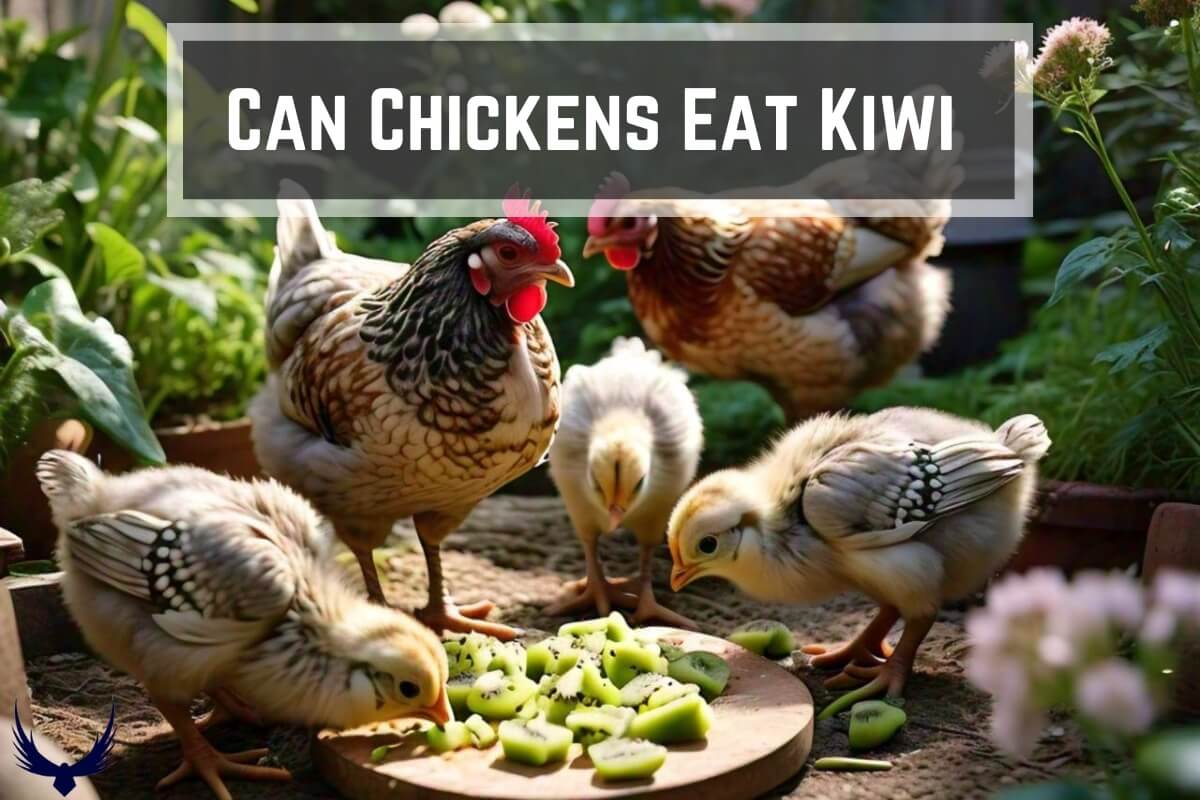Backyard chicken owners are always looking for new and healthy treats for their chickens. One interesting fruit they may consider is the kiwi. Can chickens eat kiwis? Whether you’re an experienced chicken owner or just curious, you’ll learn about how chickens can enjoy this tropical treat.
In this article we provide information on the benefits, risks, and guidelines for feeding kiwi to chickens.
What is Kiwi and Can Chickens Eat Kiwi Fruit?
Kiwi is the edible berry of a woody vine called Actinidia deliciosa. It is a nutritious fruit that is rich in vitamin C, vitamin K, vitamin E, folate, and potassium. Kiwis are oval and have a fuzzy brown exterior with a bright green flesh and small black seeds. So, Can Chickens Have Kiwis?
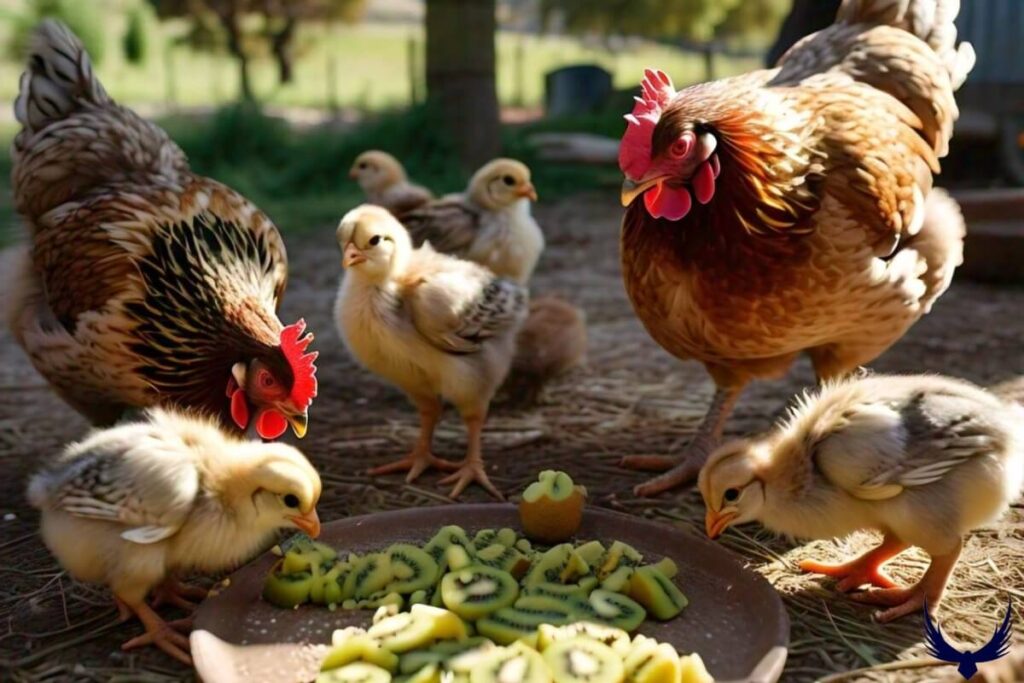
Chickens can eat kiwi fruit safely as an occasional treat along other foods. Kiwi is not toxic to chickens and provides some nutritional benefits. The high vitamin C content in kiwi can help boost the immune system of chickens.
Kiwi should only be fed in moderation due to the high sugar and acid levels. Too much kiwi can cause digestive upset or diarrhea.
Nutritional Benefits of Kiwi for Chickens
Kiwi fruit is a nutrient-dense food that can provide various nutritional benefits to chickens when fed in moderation as part of a balanced diet. Here are the nutritional benefits of kiwi for chickens:
Carbohydrates
Kiwi contains natural sugars like fructose and glucose, which can provide energy for chickens.
Proteins
Kiwi contains small amounts of protein, which is essential for growth, egg production, and health.
Vitamins
Vitamin C: It supports the immune system and collagen production.
Vitamin K: It helps in blood clotting and bone health including eggshell formation.
Vitamin E: A powerful antioxidant that protects cells from oxidative stress.
Folate: It is essential for cell growth and development, important for chicks.
Vitamins A, B1 (Thiamine), B2 (Riboflavin), B3 (Niacin), B6: Support various metabolic processes and overall health.
Minerals
Potassium: It aids in muscle function, fluid balance, and egg production.
Magnesium: It plays an important role in bone and eggshell formation as well as enzyme function.
Copper: It supports feather pigmentation and immune function.
Manganese: It is involved in bone development and antioxidant defense.
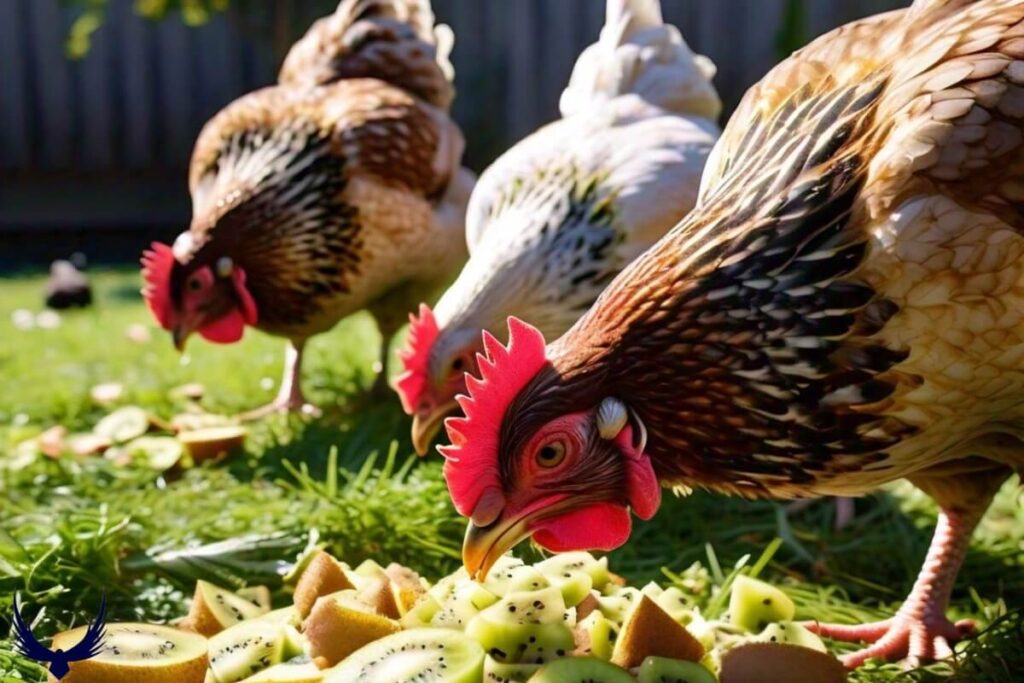
Calcium: It is crucial for eggshell formation and bone health.
Phosphorus: It is essential for bone and eggshell development, energy metabolism, and egg production.
Iron: It is necessary for red blood cell formation and oxygen transport.
Zinc: It supports immune function, wound healing, and feather development.
Antioxidants
Vitamin C, vitamin E, and various phytochemicals like lutein and zeaxanthin act as antioxidants and protect cells from oxidative damage.
Omega-3 Fatty Acids
Kiwi contains small amounts of alpha-linolenic acid (ALA), an omega-3 fatty acid that supports overall health and egg quality.
Fiber
The fiber content in kiwi can help support a healthy digestive system in chickens. It aids in the absorption of nutrients and promotes regular bowel movements.
How to Feed Kiwi to Your Chickens?
Here is the guide on how to properly feed kiwi to your chickens:
Select Ripe & Fresh Kiwi Fruits
Choose kiwi fruits that are ripe but not overripe or spoiled. Overripe or moldy kiwi can cause digestive issues in chickens.
Wash the Kiwi Thoroughly
Wash the kiwi under running water to remove any dirt, pesticide residue, or other contaminants. If the kiwi is not organically grown, consider peeling it to remove pesticide residues from the skin.
Peeling the Skin
Peel the kiwi and remove the fuzzy brown skin. Kiwi skin can be difficult for chickens to digest and may cause digestive issues.
Cut or Mash the Kiwi
Cut the peeled kiwi into small pieces or mash it to prevent choking hazards and make it easier for the chickens to consume. Whole kiwi fruits can be a choking hazard for younger birds. You can also mix the chopped kiwi with other fruits such as bananas, apples, oranges, and pineapple.
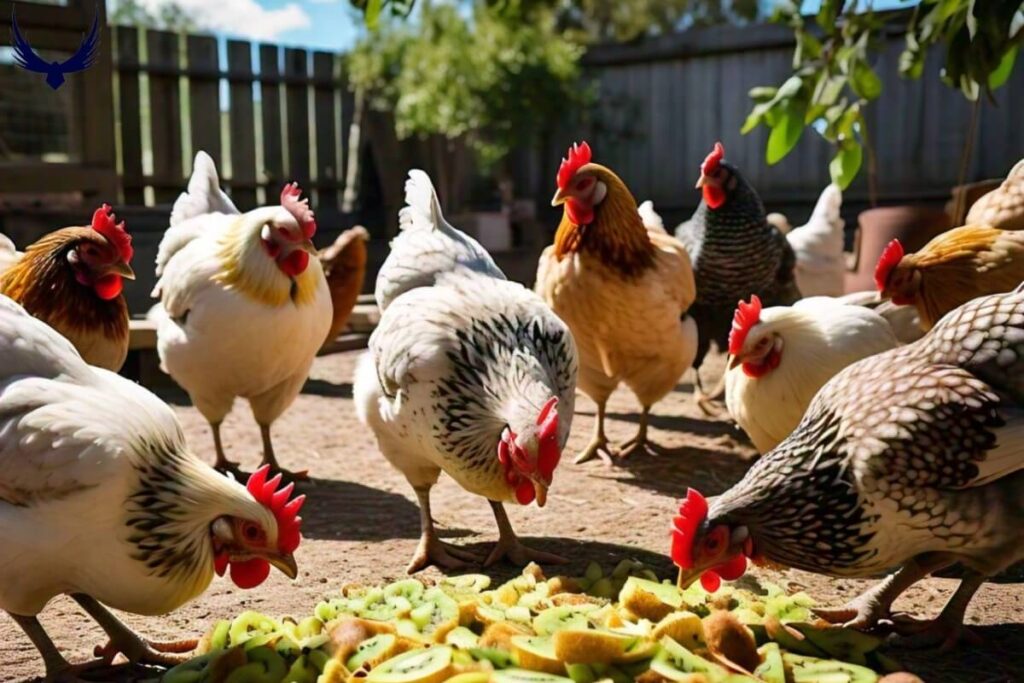
Related Post: Can Chickens Eat Mushrooms?
Offer Fresh Water
Kiwi has a high-water content, which can be beneficial for keeping chickens hydrated. But it should not replace their access to clean fresh water.
Monitor Chickens
Observe chickens for any adverse reactions or digestive issues after introducing kiwi. If any issues arise, discontinue feeding kiwi and consult with a veterinarian if necessary.
How Often Can chickens Eat Kiwis Fruit?
Here is a guide on how often chickens can eat kiwis:
Frequency
Feed chickens kiwis as a treat, not a regular food. It’s recommended to feed kiwis once or twice a week depending on the size of flock and portion sizes.
If chickens are already receiving a varied diet with other fruits like Grapes or Strawberries and vegetables like celery, broccoli, jalapenos and tomatoes, kiwis may need to be fed less frequently to maintain a balanced nutrient intake.
Age and Amount
When giving kiwis to chickens, it’s important to feed them in moderation. Adult chickens can have one or two slices of kiwi each. Younger chickens or chicks should have smaller portions, like a quarter or half slice per bird.
Individual Tolerance
Some chickens may tolerate kiwis better than others, so monitoring individual reactions is crucial when determining the appropriate frequency.
What Parts of Kiwi Can Chickens Eat?
Chickens can consume most parts of the kiwi fruit, but some parts should be avoided or prepared properly before feeding. Here is the guide on what parts of kiwi chickens can eat:
Kiwi Flesh: The flesh or pulp of the kiwi fruit is safe for chickens and provides them with various essential nutrients, such as vitamins, minerals, fiber, and antioxidants. The flesh should be cut or mashed into smaller pieces to prevent choking hazards.
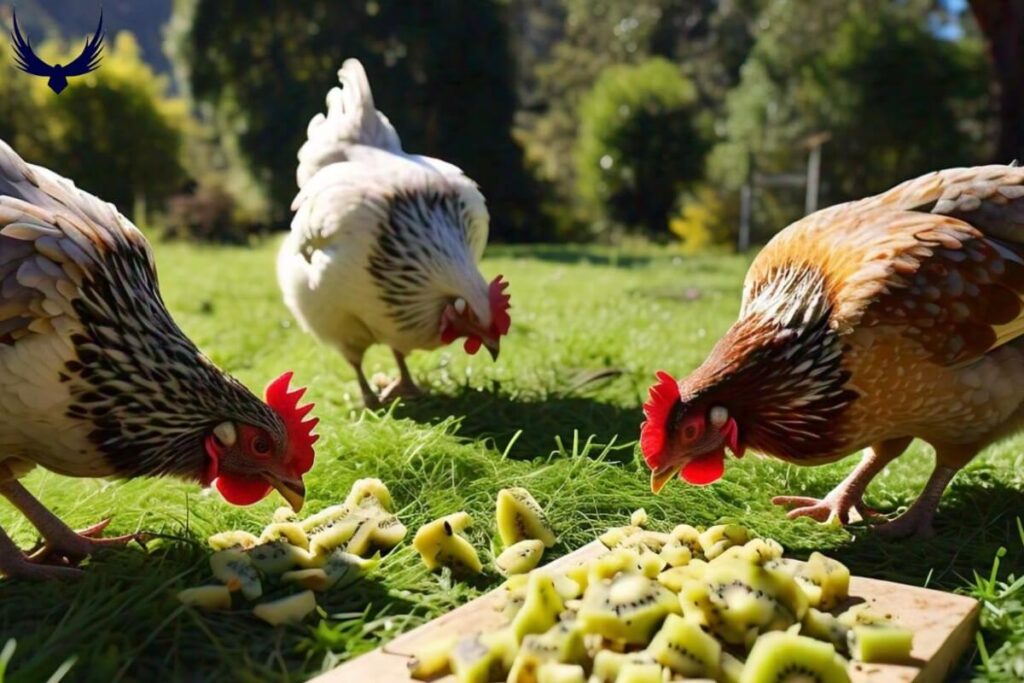
Kiwi Seeds: Chickens can eat the small black seeds found within the kiwi flesh. These seeds are a good source of fiber and healthy fats, like omega-3 fatty acids. It’s important to ensure that the seeds are well-crushed to prevent any gastrointestinal issues.
Kiwi Skin: The fuzzy brown skin of the kiwi should be removed before feeding it to chickens. The skin can be difficult for them to digest and may cause issues if consumed in large quantities. Peeling the kiwi before serving it to your flock is recommended.
Kiwi Stems and Leaves: Kiwi stems and leaves should not be fed to chickens. These parts of the plant can be toxic and may contain compounds that are harmful to chickens if consumed.
Risks of Feeding Kiwis to Chickens
Feeding kiwis to chickens does come with some risks that should be considered. Here are some of the key risks to be aware of:
Digestive Issues
Kiwis have a lot of fiber and sugar which can cause stomach issues like diarrhea if fed in excessive amounts. The kiwi seeds can also cause blockages if they’re not crushed or ground up properly.
Allergic Reactions
When you give chickens kiwis for the first time, watch out for any signs of tiredness, respiratory problems, or other negative reactions. Chickens can be allergic or sensitive to new foods, so be careful.
Choking Hazard
Whole kiwis or large pieces can be a choking risk for young or small chickens. Always cut or mash kiwis into smaller pieces before giving them to chickens.
Nutritional Imbalances
Kiwis do offer some nutritional benefits, but they should not make up a significant portion of a chicken’s diet. Overconsumption of kiwis can lead to nutritional imbalances and potential health issues.
What Things to Consider Before Feeding Kiwi to Chickens
There are several important factors to consider ensuring their safety and well-being before feeding kiwi to chickens. Here is the guide on the things to consider before feeding kiwi to chickens:
Pesticide Exposure: It’s important to wash or peel commercially grown kiwis to reduce pesticide exposure for chickens that could harm them.
Spoilage: Overripe or spoiled kiwis can harbor harmful bacteria or molds that may cause illness in chickens if consumed. It’s best to feed fresh, ripe kiwi and discard any spoiled or moldy fruit.
Can Baby Chicks Eat Kiwi?
Baby chickens, or chicks, should not be fed kiwi fruit. Kiwis are quite acidic and high in sugar, which can be difficult for a chick’s delicate digestive system to handle properly. Their diet should consist mainly of a high-quality starter feed formulated to meet their nutritional needs during the critical early growth stage.
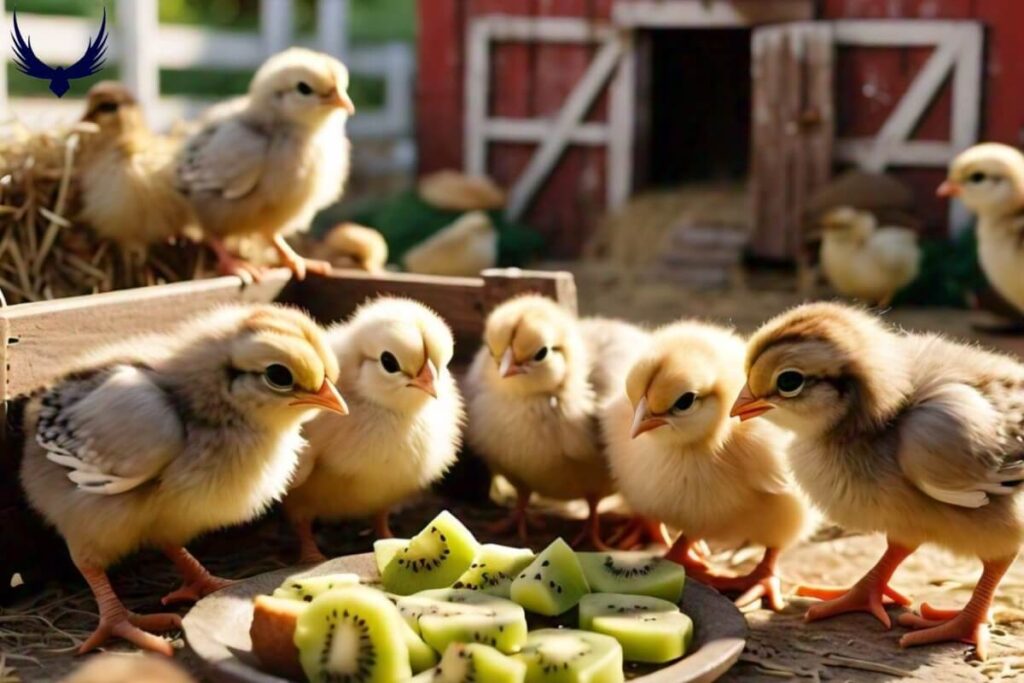
Introducing new foods like kiwi too soon can lead to digestive issues, dehydration, or nutrient deficiencies in young chicks. It is best to wait until the chicks are at least 6 to 8 weeks old before considering offering small amounts of kiwi as an occasional treat.
FAQs – Can Chickens Eat Kiwi Fruit?
Do Chickens like Kiwi Fruit?
Chickens like the sweet and tangy taste of kiwi fruit. Most chickens will eat kiwi eagerly when given as a treat. Some chickens may be indifferent or even hesitant in trying kiwi at first. It’s essential to introduce kiwi gradually and in moderation to ensure flock takes to it well. With time and encouragement, most chickens will develop a liking for this nutritious and refreshing fruit.
Can Chickens Eat Kiwi Seeds?
Yes, chickens can eat kiwi seeds. The small black seeds found within kiwi fruits are safe for chickens to consume. It’s important to crush or grind the seeds before feeding them to the flock. This will prevent any digestive issues or blockages caused by whole seeds.
Can Chickens Eat Kiwi Skins?
No, it is not recommended to feed kiwi skins to chickens. The fuzzy brown skin of the kiwi fruit can be difficult for chickens to digest properly and may cause digestive issues. It’s best to peel the kiwi and only feed the flesh to flock.
Can Chickens Have Kiwi Rinds?
Yes, chickens can safely eat kiwi rinds. The skin is not toxic and contains fiber that can be good for them. However, it’s best to cut the rinds into small pieces first to make them easier for chickens to peck at and digest.

